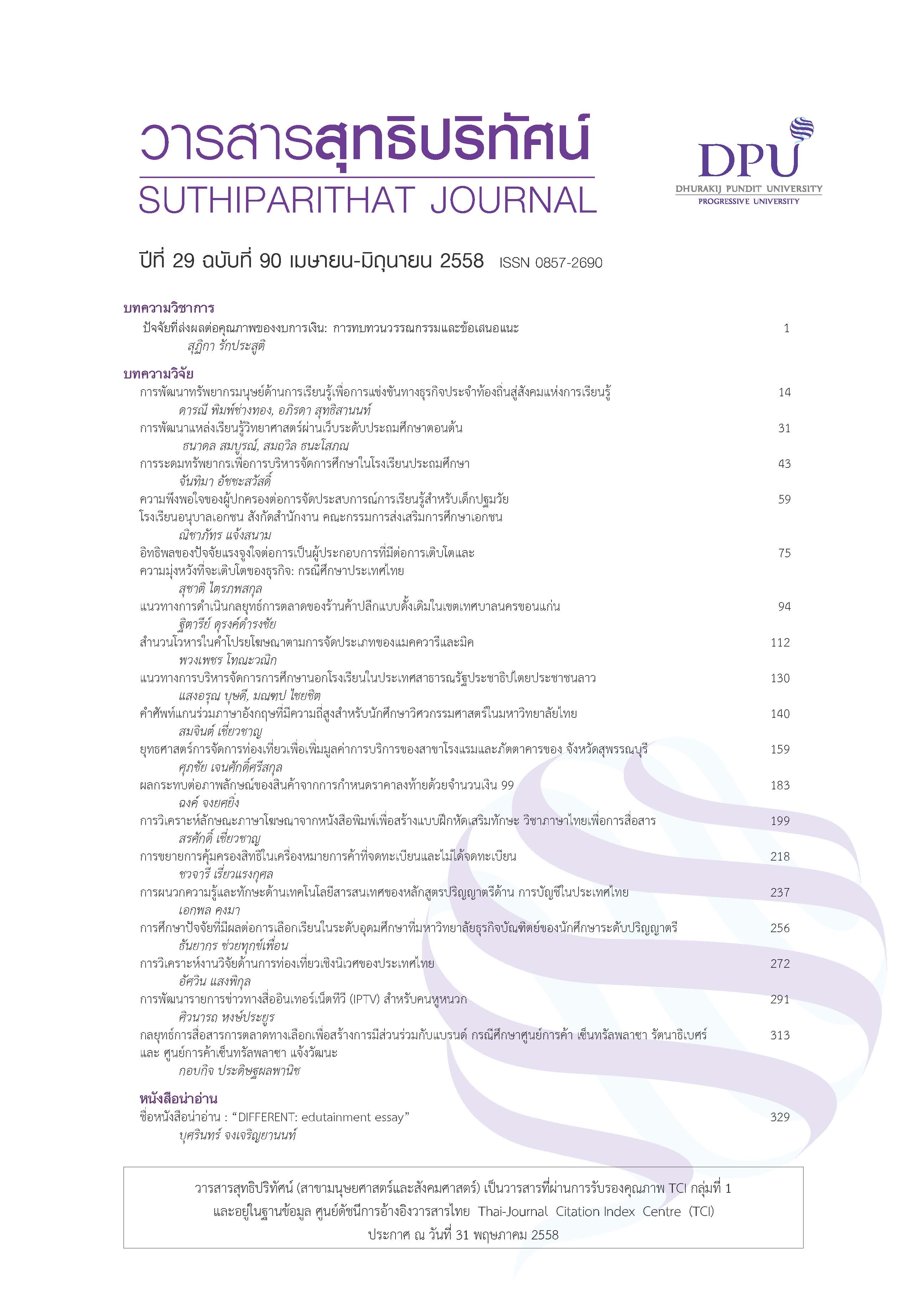การวิเคราะห์งานวิจัยด้านการท่องเที่ยวเชิงนิเวศของประเทศไทย
คำสำคัญ:
การท่องเที่ยวเชิงนิเวศ, การท่องเที่ยวอย่างยั่งยืน, ประเทศไทยบทคัดย่อ
การท่องเที่ยวเชิงนิเวศได้เกิดขึ้นเพื่อเป็นพื้นฐานของการท่องเที่ยวอย่างยั่งยืน ในช่วงหลายสิบปีที่ผ่านมา มีงานวิจัยด้านการท่องเที่ยวเพิ่มขึ้นอย่างมากมาย อย่างไรก็ตามแนวทางและทิศทาง ในการวิจัยด้านการท่องเที่ยวเชิงนิเวศของประเทศยังมีอยู่อย่างจำกัด งานวิจัยในครั้งนี้จึงมีวัตถุประสงค์เพื่อสำรวจงานวิจัยด้านการท่องเที่ยวเชิงนิเวศของประเทศไทยในช่วง 10 ปีที่ผ่านมา (2547- 2557) เพื่อเป็นประโยชน์ต่อการค้นคว้าวิจัยและการส่งเสริมงานวิจัยด้านการท่องเที่ยวเชิงนิเวศของประเทศไทยในอนาคต ผลการวิจัยพบว่า ในช่วงระยะเวลาดังกล่าวมีงานวิจัยด้านการท่องเที่ยวเชิงนิเวศจำนวน 228 เรื่องโดยประเด็นที่นิยมศึกษา เช่น การท่องเที่ยวเชิงนิเวศกับการพัฒนาชุมชนท้องถิ่น การท่องเที่ยวเชิงนิเวศในพื้นที่ธรรมชาติ และการอนุรักษ์ทรัพยากรทางธรรมชาติ/เชิงนิเวศ ทั้งนี้งานวิจัยในครั้งนี้ได้ให้ข้อเสนอแนะเพื่อเป็นแนวทางการทำวิจัยด้านการท่องเที่ยวเชิงนิเวศของประเทศไทย โดยเฉพาะในหัวข้อที่ยังมีองค์ความรู้อย่างจำกัดและหัวข้อที่ยังไม่ได้มีการศึกษา
เอกสารอ้างอิง
Akpinar, S. (2003). Globalization and Tourism. Journal of Travel and Tourism Research, 3(1&2), 22-38.
Backman, K.F. & Morais, D. B. (2001). Methodological Approaches Used in the Literature. In D. B. Weaver (Ed.). The Encyclopedia of Ecotourism (pp. 597-609). Oxon, UK: CABI Publishing.
Boo, E. (1991). Planning for Ecotourism. Parks, 2(3), 4-8.
Chin, C., Moore, S., Wallington, T. & Dowling, R. (2000). Ecotourism in Bako National Park, Borneo: Visitors’Perspectives on Environmental Impacts and their Management. Journal of Sustainable Tourism, 8(1), 20-35.
Commission of Higher Education. (2014). Higher Education Institutes in the Northern Region. Retrieved July 30, 2006, from http://www.mua.go.th/data_main/university.xls
Department of Natural Parks, Wildlife and Plant Conservation. (2014). National parks. Retired 14 October 2014 from http://park.dnp.go.th/visitor/indexnationpark.php
Doan, T. (2000). The Effects of Ecotourism in Developing Nations: An Analysis of Case Studies. Journal of Sustainable Tourism, 8(4), 288-303.
Diamantis, D. (2004). Ecotourism. London: Thomson Learning.
Fennell, D.A. & Eagles, P. (1990). Ecotourism in Costa Rica. Journal of Parks and Recreation Administration, 8(1), 23-24.
Fennell, D.A. (2001). Areas and Needs in Ecotourism Research. In D. B. Weaver (Ed.). The Encyclopedia of Ecotourism (pp. 639-653). Oxon, UK: CABI Publishing.
Higham, J. & Carr, A. (2003). Defining Ecotourism in New Zealand: Differentiation Between the Defining Parameters within a National/Regional Context. Journal of Ecotourism, 2(1), 17-32.
Ingram, H. (1996). Cluster and Gaps in Hospitality and Tourism Academic Research. International Journal of Contemporary Hospitality Management, 8(7), 91-95.
Jaipum, B. (2000). Analysis of Master Theses: A Case of Education and Curriculum during 1982-1996. Unpublished Research Report, Khon Kan University, Thailand.
Kamdit, S. & Suwoonvivate, V. (1993). An Analysis of Research Works Conducted by Instructors of Private Higher Education Institutes in Thailand. Unpublished Research Report, Dhurakij Pundit University, Thailand.
Kamdit, S. (2000). Research Methods in Tourism. Bangkok: Dhurakij Pundit University.
Lawtanavanuch. D. (1998). Report Summary of Tourism Research in Thailand: 1986 - 1996. Unpublished Research Report. Thailand Research Funds, Thailand.
Luck, M. (2002). Looking into the Future of Ecotourism and Sustainable Tourism. Current Issues in Tourism, 5(3), 371-374.
McNeely, J. & Thorsell, J. (1989). Jungles, Mountains, and Islands: How Tourism Can Help Conserve Natural Heritage. Gland: IUCN.
Nimsoomboon, N. (2002). Report Summary of Tourism Research in Thailand: 1997 - 2001. Unpublished Research Report, Thailand Research Funds, Thailand.
Patterson, C. (2002). The Business of Ecotourism (2nd ed.). Rhinelander, Wisconsin: Explorer’s Guide Publishing.
Prasitrattasin, S. (2003). Research Methods in Social Science. Bangkok: Fung Fa Printing.
Ross, S. & Wall, G. (1999). Ecotourism: Towards Congruence between Theory and Practice. Tourism Management, 20, 123-132.
Sangpikul, A. (2002). Ecotourism and Thai Youths. Unpublished Research Report. Dhurakij Pundit University, Thailand.
Sangpikul, A. (2013). An Analysis of Tourism and Hotel Studies in Thailand during the past Decade (2000 – 2010). BU Academic Review, 12(1), 113-126.
Scheyvens, R. (1999). Ecotourism and the Empowerment of Local Communities. Tourism Management, 20, 245-249.
Sethapun, T. (2013). Marine National Parks in Thailand. Retrieved July 29, 2006, from http://www.dnp.go.th/parkserve/e-book/Marine_Park_Th_Tsunami.pdf
Sirakaya, E. (1997). Attitudinal Compliance with Ecotourism Guidelines. Annals of Tourism Research, 24(4), 919-950.
Srisa-art, B. (2002). Basic Research Methods. Bangkok: Suveeriyasan Printing.
Stone, M. & Wall, G. (2004). Ecotourism and Community Development: Case Studies from Hainan, China. Environmental Management. 33(1), 12–24.
Swarbrooke, J. (1999). Sustainable Tourism Management. Wallingford, Oxon: CABI Publishing.
Thailand Research Fund (TRF). (2006). Administrative Structure. Retrieved August 2, 2006, from http://www.trf.or.th/en/admin.asp
The National Park, Wildlife, and Plant Conservation Department. (2014). National Parks in Thailand. Retrieved August 2, 2014, from http://www.dnp.go.th/parkreserve/nationalpark.asp?lg=2
Tourism Authority of Thailand (TAT). (1997). Summary of Ecotourism Policies. Bangkok: Tourism Authority of Thailand.
Vongchomphu, N. (2005). Content Analysis of Architectural Theses of Khon Kaen and Mahasarakham Universities. Khon Kaen University Journal, 10(3), 273-286.
Wangpaichitr, S. (1996). Ecotourism in Thailand. 2nd International Conference: The Implementation of Ecotourism. In Dhamabutra,
P., Stithyudhakarn, V., and Hirunburana, S. (Eds), Proceedings of the 2nd International Conference: the implantation of ecotourism (pp.14-22). Bangkok: Institute of Ecotourism, Srinakharinwirot University.
Weaver, D. (1998). Ecotourism in the Less Developed World. Oxon, United Kingdom: CAB International.
Weaver, D. (2001). Ecotourism. Milton, Queensland: John Wiley & Sons Australia.
World Tourism Organization. (2002). Sustainable Development of Ecotourism. Retrieved August 3, 2006, from http://www.world-tourism.org/sustainable/IYE-Main-Menu.htm
ดาวน์โหลด
เผยแพร่แล้ว
รูปแบบการอ้างอิง
ฉบับ
ประเภทบทความ
สัญญาอนุญาต
เนื้อหาและข้อมูลในบทความที่ลงตีพิมพ์ในวารสารสุทธิปริทัศน์ ถือเป็นข้อคิดเห็นและความรับผิดชอบของผู้เขียนบทความโดยตรงซึ่งกองบรรณาธิการวารสาร ไม่จำเป็นต้องเห็นด้วย หรือร่วมรับผิดชอบใด ๆ
บทความ ข้อมูล เนื้อหา รูปภาพ ฯลฯ ที่ได้รับการตีพิมพ์ในวารสารสุทธิปริทัศน์ ถือเป็นลิขสิทธิ์ของวารสารสุทธิปริทัศน์หากบุคคลหรือหน่วยงานใดต้องการนำทั้งหมดหรือส่วนหนึ่งส่วนใดไปเผยแพร่ต่อหรือเพื่อกระทำการใด ๆ จะต้องได้รับอนุญาตเป็นลายลักษณ์อักษรจากวารสารสุทธิปริทัศน์ก่อนเท่านั้น







